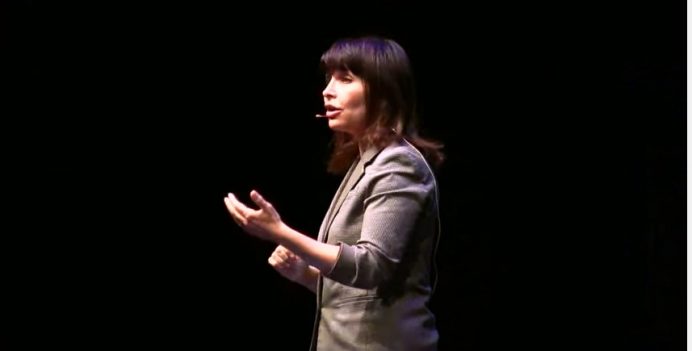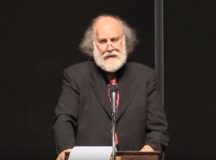Anderson’s One-State Solution ignores the certain fate of the Jews
Editorial introduction to the Symposium: Perry Anderson’s long essay, ‘The House of Zion’, was published in the November-December 2015 issue of New Left Review, the ‘flagship journal of the Western Left’. Fathom invited Shany Mor, Cary Nelson, John Strawson, Michael Walzer, Mitchell Cohen and Einat Wilf to respond to Anderson’s essay.
Available online, and given the status of an NLR ‘Editorial’, it was the Marxist equivalent of a Papal edict. Anderson was the journal’s long-time editor, and is perhaps the most gifted intellectual historian of his time, author of Lineages of the Absolutist State, Passages from Antiquity to Feudalism, Considerations on Western Marxism, English Questions, The Origins of Postmodernity, and more. In this outing, Anderson serves as episcopus servus servorum Dei, or, the servant of the servants of God (in this case a secular God). Over 14,000 words, he excommunicates the two-state solution to the Israeli-Palestinian conflict and anoints an alternative: ‘the demand for one state is now the best Palestinian option available.’
Anderson’s essay is a summa of the thinking of the Left that has lost its way on the question of Israel. For one thing, his proclamation proceeds untouched by the categories with which classical Marxism has traditionally approached unresolved national questions: ‘internationalism’, ‘chauvinism’, ‘peace between nations’, ‘people’, ‘class’, ‘consistent democracy’, ‘the right to national self-determination’, ‘minority rights’, and ‘federalism’. Instead he prefers the decidedly non-Marxist categories of ‘the Arab states’, ‘their traditional enemy’, the homeland’, ‘the West’, ‘Arab turbulence’, ‘the Zionists’, ‘the Resistance’ and ‘the New World Order’.
Anderson’s dream that the ‘strategic emplacements’ of the Arab states will end the existence of Israel is a far cry from the Marxism of Lenin, who believed national self-determination and consistent democracy was the way to ‘clear the decks for the class struggle’; from the sophisticated discussions of the national question, the rights of peoples, and the mechanics of federalism of the first four congresses of the Communist Third International; and from Trotsky’s late support of the Jewish people’s right to survival as a nation and to live as a ‘compact mass’. In place of all that, conspiracism is passed off as sophisticated geopolitics, class politics is bracketed ‘for the duration’, and fascistic political forces are embraced as ‘the resistance’.
*
Einat Wilf argues that the partisans of the so-called ‘one-state solution’ are blind to the necessary condition for two peoples living peacefully in one state: mutually accepted collective and individual equality. Since that necessary condition does not exist, the one state framework would merely serve to change the title of the conflict from the Israeli-Palestinian conflict to the Jewish-Arab civil war. It would solve nothing.
If Jews and Arabs are to exist peacefully and achieve justice in the framework of a single democratic state, as proposed by Perry Anderson, the acceptance by both peoples of the equality of the other, both as collectives and as individuals, is a necessary condition.
If Jews and Arabs are to draft a constitution that would be more than a useless piece of paper and which would secure their joint lives together, they must recognise each other as equal claimants to the land, and must recognise each other as people of equal value, regardless of their differences. Such an agreement is necessary because both peoples would be forfeiting their universal right to self-determination in a nation state of their own, for the purpose of living together in a single state. Both would need to have assurances beyond reasonable doubt that their rights as individuals and as a collective would be secured in a single state.
If either Jews or Arabs living in a territory under a single governing framework operate under the belief that the other people as individuals, are not their equals, and that as a collective they do not possess the equal right to be in the territory of the state, they would merely use the mechanisms of the state, as well as violence, to oppress the other people and try to push them out of that territory. Peaceful democratic life together would not be possible.
The intellectual argument for a one-state solution collapses if any of the sides can demonstrate they have good reason to believe that the single-state framework would deny them justice and equality. When religious supremacist Jews argue for a one-state solution, conveniently excluding Palestinians in Gaza and the Diaspora and offering convoluted responses to the questions of whether there will be civic equality for all, Arabs can make a very strong case that such a ‘solution’ is not promoted in good faith, and that Palestinian Arabs could not expect to be treated justly or equally in such a state.
That is more than enough to reject any such plans.
The reverse is equally true: when Arab Palestinians, or left-wing intellectuals who claim to uphold the Arab Palestinian cause, promote a one-state solution (even if only as a rallying cry), in which, as a result of immigration and growth rates, Arabs would quickly be the majority and Jews would live as a minority, the burden of proof lies squarely with the Arabs. Jews have every right to ask if they would be treated justly and equally in a single Arab majority state.
Can they make a compelling case that they can be entrusted with the equal treatment of Jews in a single state in which the Arabs are a majority? No.
To be fair, even today, very few countries in the world could make such a compelling case. (It is for precisely this reason that the Jews insist on realising their universal right to self determination.) Even those very few countries that could demonstrate their ability to treat Jews as equals and protect their rights, have only fully done so in recent decades, and among them even fewer countries appear substantially secure from the danger of reversal of their equal treatment of Jews. Indeed, the very few countries on this list are the only ones where Jews live and prosper in large numbers.
No Arab country is on that list. Jews, as individuals, have never been treated as the equals of Arabs in any country where Arabs have been a majority. Jews, as a collective, were never accepted as an equal people: equal to Arabs in their claim to their ancestral land or equal in their claim to any part of the decaying Ottoman Empire, where they both lived. Arab society has continuously denied the idea that the Jews are their equals as individuals, and have certainly and violently denied the notion that the Jews are a people and a nation, of equal standing to the great Arab nation or the various Arab nations.
A mythology reigns in some circles, promulgated at times by the Arabs themselves, that Jews and Muslims lived for centuries in harmony in Arab lands. The implication is that were it not for Zionism, this could have continued. It is akin to the myth promulgated by Margaret Mitchell of the harmony of blacks and whites in Gone with the Wind. To the extent any such harmony existed between Jews and Muslims in the Arab world, it emerged from Jews acknowledging and accepting their subordinate status as inferior ‘Dhimmis’, tolerated and protected by Muslims as ‘people of the book’ (rather than being killed or forcefully converted as infidels). As long as Jews accepted their status as ‘protected subservient people’ to the Arab Muslims, and it was clear who was the master and called the shots, they could live in relative harmony. It is a harmony that could only endure as long as those considered inferior did not have the gall to claim their equality.
The Arab Muslim world can definitely demonstrate extended periods in history when it treated the Jews better than had Christian Europeans, and could pride itself on not having committed industrial genocide of the Jews – albeit that is quite a low bar – but it cannot make any claim that it ever saw or treated the Jews as genuine equals.
The so-called harmony between subordinate and superior was indeed disturbed when the Jews, first under colonial rule, which introduced the idea of emancipation, and later with the rise of Zionism, dared to claim their equality. The preposterous Jewish claim to equality with Muslims in Arab lands led to the rise of violence, blood libels and pogroms against the Jews, culminating in the ethnic cleansing, property confiscation and expulsion of the Jews from Arab lands – approximately one million in number, some in communities which pre-dated Islam – in revenge for the greatest transgression of all: the Jewish insistence that they are a people and a nation, no less than Arabs. Moreover, that they have a right to a sovereign state of their own in a small corner of the disintegrating Ottoman Empire, which also happens to be their ancestral homeland, and which the Arabs have considered their own, since their conquest of it in the seventh century.
Ever since, Arab society has continually denied that the Jewish people are their equals as a people, accepting them as members of a religion only, and denying their collective rights in their land, arguing that the Jews are not a people of the land, but foreigners, with no connection to it. Zionism was not the source of Muslim Arab attitude towards Jews – it merely forced that attitude into sharp relief.
The 1947 UN partition, and all other subsequent offers and opportunities of partition between a Jewish state and an Arab state were denied, not on account of the inequitable division of the land, but on account that a Jewish state in any part of the land – whether it be on 1 per cent or 99 – was considered an insult. The Jewish claim of equality with the Arabs as a people has been the fountain of the persistent refusal of Arab and Palestinian leaders to accept any two-state solution, whether in 1947, 1967, 2000 or 2008.
The casual assumption that Arab Palestinian leaders have at any point truly accepted the two-state (as in a Jewish state and an Arab state) solution, and that Israel is at fault for killing off this option through settlement building – rehearsed here by Anderson – conveniently ignores the fact that the Arab Palestinians never accepted the two states for two peoples solution, nor any agreement that would create a Palestinian state – if such an agreement entails the final acceptance that the land would be shared with a Jewish state. At least in 1947 the Arab states had the integrity to publicly admit that their rejection of partition was based on the conviction that any Jewish state, of any size, was an intolerable insult.
But perhaps Jews should ignore all this baleful history and look with optimism to the present? Unfortunately, there is little in today’s Arab world which inspires confidencethat the Arabs are transcending their past and are willing to include and protect minorities. Anderson ignores the blunt truth: today, violence is engulfing the Arab world and is leading to the ethnic cleansing and genocide of minorities who are considered inferior to (Sunni) Muslim Arabs. Ancient Christian peoples and sects are being expelled and killed, and the only minorities capable of avoiding this fate are those which possess arms.
So if no-one can point to a moment in history when Jews were treated as equals by Arabs, whether individually or as a collective, and the present appears even worse than the past, on what grounds should we follow Anderson and urge the Jews to ‘rely on the kindness of strangers’, entrusting their fate to those who refuse to recognise them as a people with a legitimate claim to the land and well as their individual equals?
None.
The partisans of the so-called ‘one-state solution’ are blind to the necessary condition for two peoples living peacefully in one state: mutually accepted collective and individual equality. Since that necessary condition does not exist, the one state framework would merely serve to change the title of the conflict from the Israeli-Palestinian conflict to the Jewish-Arab civil war. It would solve nothing.
Ultimately, there are two peoples, tribes, and nations on this land. Whatever argument each side makes about the invented nature of the other, it is clear that at the very least, each side sees itself as distinct and different from the other people in that land. Both believe they have the legal, emotional, historical, and just claim to the entirety of the land. Save for a few rare and courageous individuals, the Palestinians believe that the Jews have no legitimate claim to the land. The Jews are generally divided on the issue of the legitimacy of the Arab claim. This says nothing about their respective moral nature – merely their differing regional realities. The Jews are keenly aware of their minority status in the region; they can ill afford to ignore the Arabs. The Palestinians, who live in a region where Arabs enjoy predominance, believe they can continue to imagine that the Jews are foreigners and crusaders who will not endure.
Justice and peace can only be served once both sides acknowledge the equal and legitimate claim of the other to the land, and their status as equals, both as collectives and as individuals. They will both have to accept that neither can have it all and that their right to all of the land is limited by the existence of another people with that equal right. This will happen one day, but not before each side has given up on the delusion that the other will somehow, someday be made to disappear.
Once both sides recognise the equal rights of the others as collectives and individuals to all of the land, and accept that neither can have it all, they can then figure out how best to organise their lives in a way that maximises their own hopes and dreams while leaving room for those of the other. After all, this is as much a necessary condition for the success of the two-state solution as it is for the one-state solution, if any is to be a solution at all. So whether the best way to organise the lives of Jews and Arabs in the land is by means of two states, one state, confederation, federation, economic union, or any other imagined idea, those are the details that can and should only be figured out by both sides. As much as the Jews need to be held to account on this issue of equality, it is time to demand that Arabs too demonstrate that they are willing to treat the Jews as their equal claimants to the land and as their individual equals. More than the fate of the people of Israel and Palestine depends on it: the fate of the entire Arab world, its liberty and prosperity, depends on whether Arabs in general, and Sunni Muslim Arabs in particular, can accept in their midst those who are different from them, both as collectives and as individuals, and treat them as their equals.

































Comments are closed.